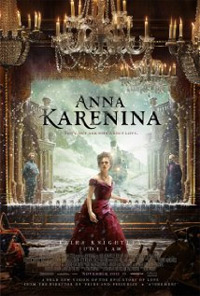Anna Karenina Review: Creative And Breathtakingly Beautiful
Joe Wright proves his directorial prowess yet again. Keira Knightley’s performance as the deliriously happy yet tormented Anna Karenina is absolute genius. Every glance, every anxious laugh, is perfectly timed and poignant. Jude Law settles into his role as her saintly husband Alexei Karenin. It is quite unlike his usual light fare, but reminiscent of his work on films like Closer, highlighting his ability to pull back and share the scene. Knightley proves a capable companion, matching Law’s screen presence with ease.
Matthew Macfadyen is utterly delightful as Anna’s brother, Stiva Oblonsky, whose long-winded musings I well remember from Tolstoy’s novel. His expensive tastes—costly in coin and emotional well-being—are the very essence of Tolstoy’s message. Yet somehow that message seemed lost in the screen adaptation. Pieces of the underlying story of class inequality show up now and again at the train station and in the inspired words of Katya Levin, played by Domhnall Gleeson. The message is there for those who are keen to see it, but likely it will be lost to most viewers amidst the enveloping romance and the beauty of the set and costumes.
That is not to say that the love story and visual delights should take a back seat. The infamous tale of passionate love, as it plays out against the glittered backdrop of westernized St. Petersburg, Russia, in the late 1800s, shines under Wright’s direction. The pairing of costume designer Jacqueline Durran and production designer Sarah Greenwood creates a visual masterpiece that is exquisitely heightened by the music of Dario Marianelli. The costumes, says Durran, are “taking that kind of post-war [1950s] movement of a very architectural, strong silhouette shape and applying that principle to the 1870s. What the director wanted was just to clean down the lines of the 1870s so that you get left really with a silhouette.”
That ornate simplicity is also reflected in the production and set design, which finds itself overlapping between stage sets and life scenes. The cinematography almost seems the child of Roberto Schaefer’s Finding Neverland and of Terry Gilliam. Instead of seeming farcical, the revolving theatre sets only add to the whimsical nature of the nineteenth century upper class. “Joe set the piece in a theatre,” said Knightley, “because during that period in Russia people were pretending to be something that they weren’t, all the time.”
Following the release of Anna Karenina, the films Les Miserables and The Great Gatsby will round out this year’s theatrical criticism of strict societal rules and the financial gap. This particular film seems fitting as the first to arrive, offering more visual delight and emotional turmoil than political and social advice. As Tom Stoppard points out, “You can’t actually do a film of Anna Karenina with all of the bits and all of the characters,” but instead you “write a page-turner of 130 pages out of these 600 pages.” And with the help of excellent direction and creative design, he does just that.
The creativity of this film is a stroke of genius, and the the beauty of it is breathtaking. While I would be interested in seeing a more true-to-life version with Russian actors and actresses, the British players well capture the essence of nineteenth century Russian upper class woes. The primary love triangle encircling Anna Karenina captivates the audience as it capsizes into itself. Yet a purer love story is interwoven in the tale of Katya Levin and his beloved Kitty Scherbatsky. As with his masterpiece in Pride & Prejudice, Joe Wright’s retelling of Anna Karenina gives this generation of films something classic to strive for.
Review By: Alexandra Pauley



Responses